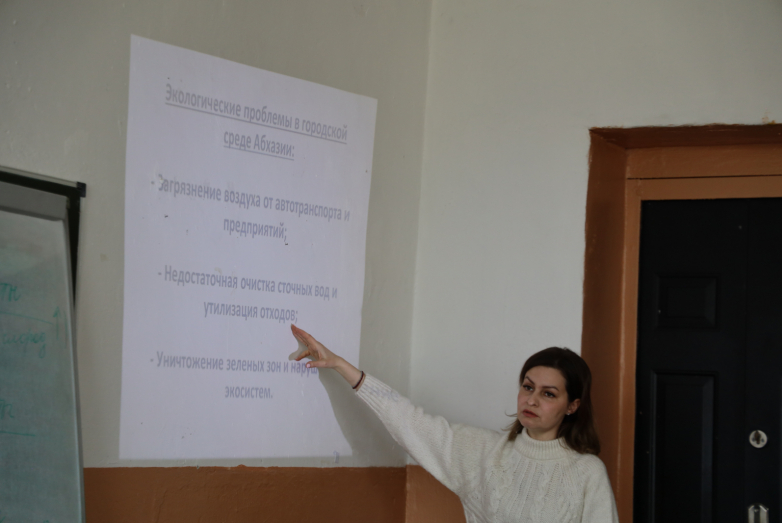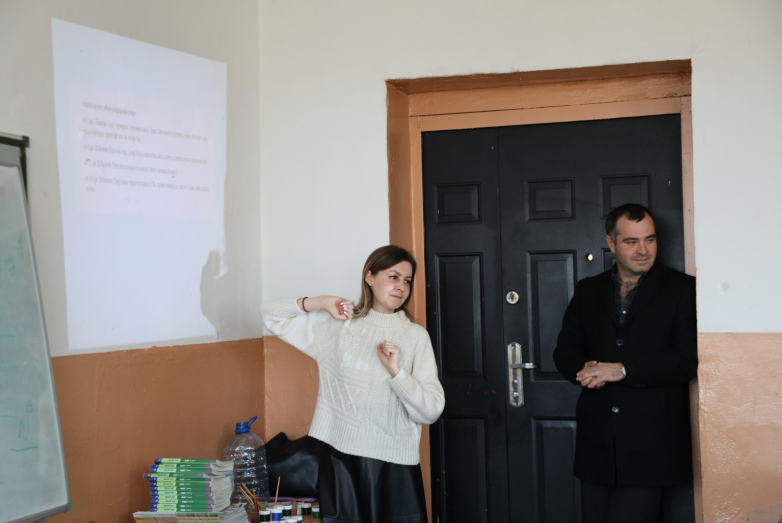The Department of the World Abaza Congress on Education, Social Development and Health has launched a new project - environmental training for schoolchildren.
Selma Bazba
The WAC OSAZ Department has begun implementing a new project on environmental training “Ecological problems of the urban and rural environment: how can we solve them?” together with senior teacher, methodologist of the Department of Ecology and Animal Morphology of ASU Maya Tsybulevskaya.
The purpose of the trainings is to develop healthy eco-habits in children, a caring attitude to nature and to foster an interest in an environmentally friendly lifestyle.
The first visit within the project took place in a school in the Dranda village. Participants discussed environmental problems in the urban environment of Abkhazia, such as air pollution from vehicles and enterprises, insufficient wastewater treatment and waste disposal, destruction of green areas and disruption of ecosystems. They also touched upon environmental problems in the rural environment of Abkhazia - the use of pesticides and chemical fertilizers that pollute soil and water resources, deforestation and loss of biodiversity, problems of water protection and control of pollution of water sources.
According to the head of the WAC department for education, social activity and health (OSAZ - ed.) Izolda Khagba, this was the first of 14 trainings planned for 2024, which will mainly be conducted in rural schools.
“The decision to conduct environmental training was driven by the global agenda, namely the need to convey to our children the understanding that each of us bears personal responsibility for preserving the unique nature and ecology of our region, as an integral part of the world ecosystem. To make the trainings more interesting and interactive, we invited a specialist who works with children using the Singaporean education system. This way, we not only pass on ready knowledge to children, but also invite them to discussion, reflection, and defend their point of view on this issue. I think that this is an important skill that will be useful to them a lot in their lives,” said Khagba.
In her opinion, an important aspect of the trainings is the formation of self-awareness and strengthening of civil society through increasing environmental awareness.
The training at Dranda Secondary School lasted just over an hour. The students were actively involved in the process. The training moderator gave a presentation on environmental problems of the urban and rural environment in Abkhazia and in the world.
Participants discussed ways to solve them and the benefits of eco-habits. The students then took a test called “My Carbon Footprint,” which is aimed at identifying environmental awareness. Schoolchildren participated in a discussion with the training moderator and shared their opinions.
Maya Tsybulevskaya, a methodologist at the Department of Ecology and Animal Morphology at ASU, noted the success of the first training and emphasized the relevance of environmental education.
“The topic of environmental education is especially relevant in Abkhazia, because there is a gap in our education in the field of environmental awareness. This knowledge needs to be cultivated from an early age. It is always necessary to develop and promote the topic of environmental education, since it is closely related to the life of people on the planet. For example, just as we learn foreign languages, we must also learn the language of nature and proper handling of it,” said Tsybulevskaya.
The schoolchildren were also satisfied with the results of the training. Student Valeria Melnikova noted that during the conversation, she had an idea about how people, every day, without thinking, make environmental mistakes, and they, in turn, can pose a threat to others.
“I learned that we need to be more careful about the ecology of our country, everyone should understand responsibility and watch their actions.We observe how people throw garbage in the wrong places, neglect nature, and much more. Definitely, environmental training should be conducted in schools, because the more we hear about conscious actions, the more often we do them,” she said.
Specialist of the WAC OSAZ department emphasized the need for environmental training for students in rural schools.
“The environmental agenda is not a new phenomenon in public life, however, it seems that students in rural schools are much less likely to encounter information about the importance of preserving the environment and the harm of neglecting the environment. Rural children of Abkhazia live in conditions of clean and relatively untouched nature, which can give a false impression of the unlimited nature of this resource" - he said.
According to Khishba, the more often a student efficiently interacts with information about the importance of caring for nature, the greater the likelihood that in the future, at the level of personal habits, a person will act with an understanding of the importance of preserving the ecology of Abkhazia for future generations.
Interactive training on ecology is a new project of the WAC OSAZ, launched in 2024. It is aimed at developing environmental awareness in children - a system of values, knowledge and behavioral practices aimed at fostering interest and respect for nature.


to login or register.